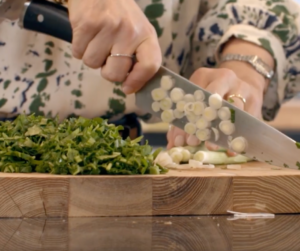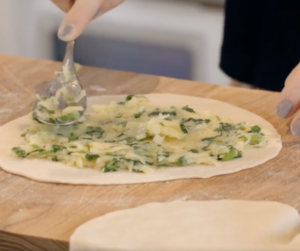Longing for Acceptance
Every time Farishta rides her bicycle along the trails in her new community in the US, she thinks about Afghan women. Since the Taliban regained power after the collapse of the Afghan government in 2021, women are no longer allowed such freedoms as riding a bicycle.
“Right now in Afghanistan, women aren’t allowed to do anything,” Farishta explains. “They cannot work. They cannot get an education. They cannot drive. They cannot go to a swimming pool. They cannot ride a bicycle. They are just breathing. They are alive, but they do not have a life.”
Farishta and her family left Afghanistan when the Taliban first came to power in 1996. As a part of an ethnic minority in Afghanistan, her family suffered persecution for many years. Her parents were forced to make the difficult decision to leave their home in Parwan, near the capital city of Kabul, in order to protect their family. They immigrated to Pakistan and then eventually to Turkey, where they are currently living.
“It is hard to not be with my parents right now,” explains Farishta. “It is hard for them to live in Turkey. They don’t know the language there. We just want peace. We don’t have that. They just want acceptance from the different countries they live in because they are already going through a lot of pain.”
Finding Our Shared Humanity
 Recently Bri, Sarah, and some of our Women of Welcome community members had the incredible opportunity to get to know Farishta as they cooked and shared a meal together along with Mexican chef and TV personality, Pati Jinich on her cooking show, Thriving Through Food.
Recently Bri, Sarah, and some of our Women of Welcome community members had the incredible opportunity to get to know Farishta as they cooked and shared a meal together along with Mexican chef and TV personality, Pati Jinich on her cooking show, Thriving Through Food.
“Showing love by feeding people is part of our shared humanity,” explains Pati. “Cultures all over the world, including Afghanistan where Farishta is from, have dishes that are special for bringing people together, but it isn’t always easy to find people to share within a new country.”
As Women of Welcome, we know sharing a meal allows people to come together and connect on a deeper level. It provides an opportunity for conversation, storytelling, laughter, and the exchange of ideas. Eating together fosters a sense of belonging, strengthens relationships, and deepens social connections.
A Symbol of Hospitality and Sharing
 Many cultures have rich traditions and rituals associated with meals and gatherings. Farishta taught us how to cook bolani, a traditional and beloved Afghan dish that is similar to a stuffed flatbread or a filled pastry. The dish consists of a thin, unleavened dough that is typically filled with various ingredients such as mashed potatoes, spinach, leeks, or lentils. The filling is then folded into the dough and cooked on a griddle or pan until crispy and golden brown.
Many cultures have rich traditions and rituals associated with meals and gatherings. Farishta taught us how to cook bolani, a traditional and beloved Afghan dish that is similar to a stuffed flatbread or a filled pastry. The dish consists of a thin, unleavened dough that is typically filled with various ingredients such as mashed potatoes, spinach, leeks, or lentils. The filling is then folded into the dough and cooked on a griddle or pan until crispy and golden brown.
Farishta explains that bolani is a form of cultural identity learned from generations. It also serves as a symbol of hospitality and sharing. It is often prepared by Afghan families to welcome guests or to be shared among friends and relatives. The act of making and serving bolani can foster a sense of community and connection.
During our time with Farishta, we not only enjoyed her delicious bolani, but the Women of Welcome members also brought their favorite family dishes like a gooey butter cake from St. Louis. As we shared these delicious foods with each other, we also shared our stories and our hearts.
 Pati said it best: “Immigrants love bringing the foods from their country! It’s so fascinating how we can get to know each other a little bit through food.”
Pati said it best: “Immigrants love bringing the foods from their country! It’s so fascinating how we can get to know each other a little bit through food.”
Women of Welcome, don’t miss the incredible opportunities you have in your own communities to put your welcome into action! You too can connect with immigrants like Farishta by inviting them to share a meal with you. You will learn so much about their stories and culture all while enjoying delicious food!
Check out the full episode of Thriving Through Food with Pati, Farishta, and the Women of Welcome community members.
And, try Farishta’s bolani recipe below. Let us know how it turned out and who you shared it with!
Ingredients:
- 2 cups all-purpose flour
- 1/2 teaspoon salt
- 1/2 cup warm water
- 2 medium potatoes, boiled and mashed
- 1 small onion, finely chopped
- 2 tablespoons fresh cilantro, chopped
- 1 teaspoon ground cumin
- 1/2 teaspoon ground coriander
- Salt and pepper to taste
- Vegetable oil for frying
Instructions:
- In a large mixing bowl, combine the flour and salt. Gradually add warm water and knead the mixture until you have a smooth dough. Cover the dough and let it rest for about 30 minutes.
- In a separate bowl, combine the mashed potatoes, chopped onion, cilantro, cumin, coriander, salt, and pepper. Mix well to incorporate all the ingredients.
- Divide the dough into small portions (about the size of a golf ball) and roll each portion into a thin circle on a floured surface.
- Place a spoonful of the potato filling onto one half of the dough circle. Fold the other half over the filling to create a semicircle. Press the edges firmly to seal the bolani.
- Heat a skillet or frying pan over medium heat and add a small amount of vegetable oil.
- Place the bolani in the pan and cook until golden brown on both sides, flipping once. Repeat this process for the remaining bolani.
- Once cooked, transfer the bolani to a plate lined with paper towels to drain excess oil.
- Serve the bolani warm with yogurt or chutney for dipping.
Feel free to adjust the fillings according to your preferences. You can also experiment with other variations, such as spinach, leek, or lentil fillings.
Enjoy your homemade bolani!

 This resource answers the most common questions Christians have about immigration and equips you to engage conversations with biblical clarity, truth, and grace.
This resource answers the most common questions Christians have about immigration and equips you to engage conversations with biblical clarity, truth, and grace.